Online Tutoring for Special Needs Students

Fanie Naude
CEO & Founder of Knowledgeable Tutor, Buznet Direct, YMC & Naude Consulting

Fanie Naude
CEO & Founder of Knowledgeable Tutor, Buznet Direct, YMC & Naude Consulting

Introduction
Welcome to this comprehensive guide on online tutoring for special needs students. As educators in the digital age, we are bestowed with both the opportunity and responsibility to adapt our teaching methods to cater to all learners. This article aims to be your go-to resource for understanding the nuances, challenges, and effective strategies involved in online tutoring for special needs students. From leveraging adaptive learning software to understanding the ethical landscape, we cover it all.
"The function of education is to teach one to think intensively and to think critically. Intelligence plus character—that is the goal of true education." - Martin Luther King Jr.
Summary of the Article's Key Points
- Adaptive Learning Software: Explore how platforms like DreamBox offer real-time adaptability to cater to individual learning needs.
- Flexibility in Teaching: Understand why a flexible approach is crucial, especially when dealing with a diverse range of learning requirements.
- Ethical Considerations: Learn about the ethical standards that must be upheld in the realm of online tutoring.
- Individualized Education Plans (IEPs): Discover the importance of legally mandated IEPs in providing tailored education to special needs students.
- Challenges and Mitigation Strategies: Delve into the common challenges like technological barriers and engagement issues, along with actionable solutions.
- Effective Time Management: Gain insights into breaking down lessons into micro-lessons for better engagement and understanding.
- The Role of Parental Involvement: Understand why parents are the third pillar in the educational trinity and how their involvement can make or break the tutoring process.
- Marketing and Trust Building: Learn how to establish a brand of trust, especially when the stakes are high, as in the case of special needs education.
- Legal Aspects and Compliance: Get a brief overview of the legal landscape that governs online tutoring for special needs students.
By the end of this article, you will be well-equipped with the knowledge and tools to provide an enriching and effective online tutoring experience for special needs students.
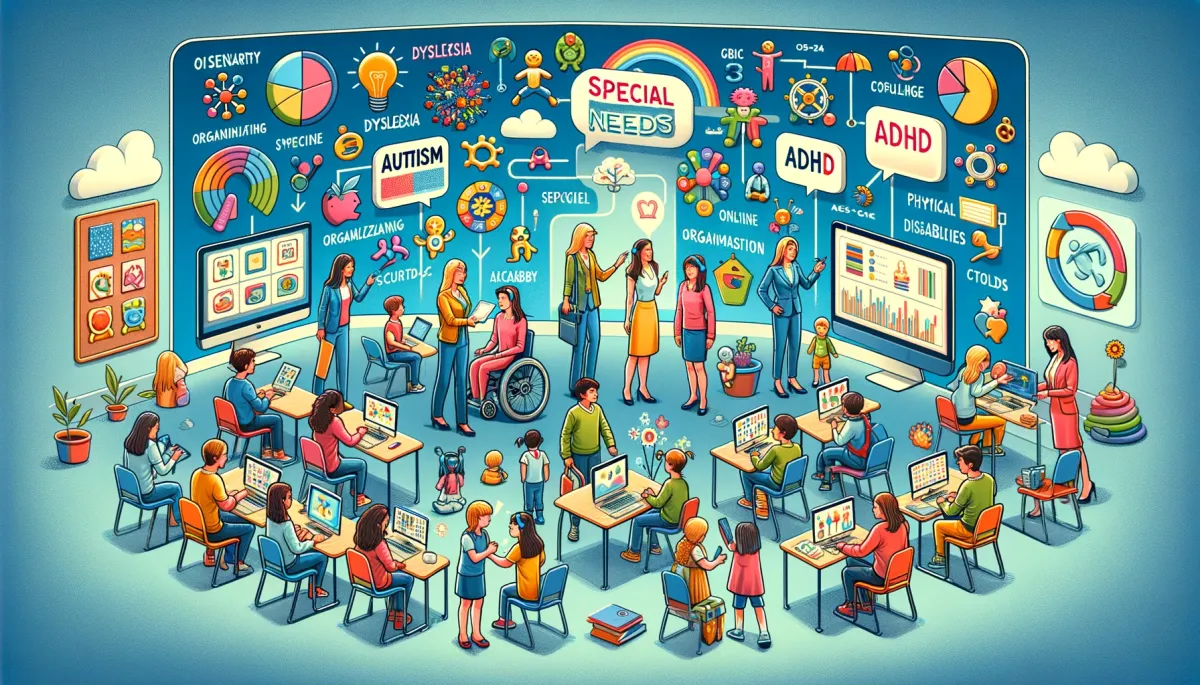
2. Types of Special Needs: A Deep Dive into Categories and Strategies
Understanding the types of special needs is not just a prerequisite but a cornerstone for effective online tutoring. Each category comes with its own set of challenges and requires a unique teaching approach. As the renowned psychologist Carl Rogers said, "The only person who is educated is the one who has learned how to learn and change." This section aims to help you adapt your teaching methods to suit the diverse learning needs of special needs students.
Learning Disabilities
Dyslexia
Dyslexia primarily affects reading and writing skills. Tutors should focus on visual aids and interactive reading exercises to help these students. Tools like Ghotit Real Writer can be invaluable for dyslexic students.
Solutions:
- Use multi-sensory techniques like the Orton-Gillingham approach.
- Implement text-to-speech software to aid in reading comprehension.
For more insights, check our guide on Teaching Different Subjects Tips And Techniques.
Dyscalculia
This learning disability affects a student's ability to understand numbers and mathematical concepts. Manipulatives and real-world examples can be particularly effective.
Solutions:
- Use virtual manipulatives like Number Pieces to help students visualize mathematical operations.
- Incorporate everyday scenarios to teach basic arithmetic.
For more on this, refer to our article on Creating Effective Lesson Plans For Online Tutoring.
Autism Spectrum Disorders
High-Functioning Autism
Students with high-functioning autism benefit from structured lessons with clear objectives.
Solutions:
- Use visual schedules to outline the day's activities.
- Employ social stories to teach social cues and norms.
For more strategies, visit Maintaining Student Engagement In Online Tutoring.
Asperger's Syndrome
These students often struggle with social interactions. Social stories and role-playing can be effective teaching tools.
Solutions:
- Use video modeling to teach appropriate social behavior.
- Implement interactive software like Brain Parade to improve communication skills.
ADHD
Hyperactive Type
Incorporate physical movement and short bursts of focused activities to engage these students.
Solutions:
- Use active learning strategies like 'Think-Pair-Share.'
- Implement a token system to reward focus and participation.
Inattentive Type
Students with this type of ADHD struggle with maintaining attention. Gamification can be a useful strategy.
Solutions:
- Use platforms like Kahoot! to make learning interactive.
- Implement frequent breaks using techniques like the Pomodoro Technique.
For more on ADHD strategies, refer to Tools And Technology For Effective Online Tutoring.
Emotional and Behavioral Disorders
Oppositional Defiant Disorder (ODD)
Implement a reward system for positive behavior.
Solutions:
- Use a point-based reward system to encourage compliance.
- Implement 'time-out' strategies for de-escalation.
Anxiety Disorders
Creating a safe and predictable online environment is crucial for students with anxiety disorders.
Solutions:
- Use relaxation techniques like deep breathing to start sessions.
- Maintain a consistent routine to create a sense of predictability.
For more on managing emotional and behavioral disorders, check Handling Difficult Tutoring Sessions.
By understanding the types of special needs and adapting your teaching methods accordingly, you can create an inclusive and effective online learning environment. This is not just about meeting educational standards but about fulfilling the unique potential of each student.
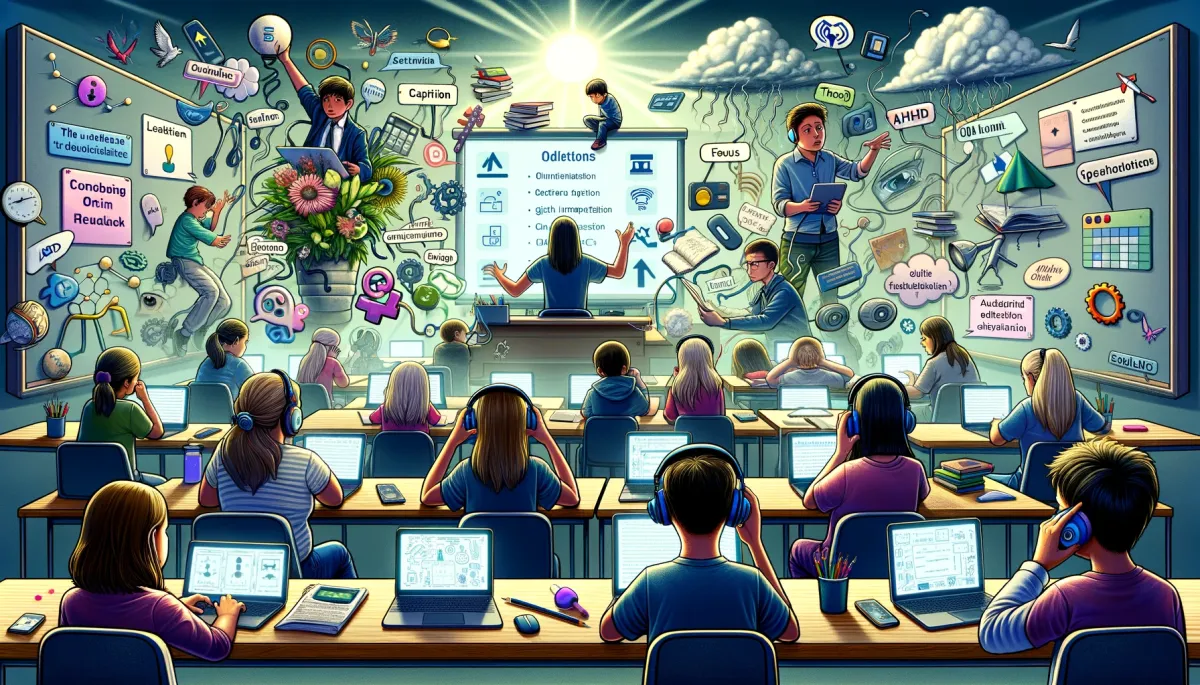
3. Challenges in Online Tutoring for Special Needs
Navigating the landscape of online tutoring for special needs students is akin to sailing in uncharted waters. Each student presents a unique set of challenges that require tailored solutions. As Winston Churchill wisely stated, "Success is not final, failure is not fatal: It is the courage to continue that counts." Let's delve into some of the most common challenges and how to overcome them.
Technological Barriers
The digital divide can be a significant hurdle, especially for families that may not have access to high-speed internet or advanced hardware.
Solutions:
- Low Bandwidth Solutions: Use platforms that require minimal bandwidth.
- Hardware Grants: Seek grants or partnerships to provide necessary hardware to students.
For more on overcoming technical challenges, refer to How to Handle Technical Difficulties During Sessions.
Maintaining Engagement
Keeping a special needs student engaged during an online session can be a Herculean task.
Solutions:
- Interactive Tools: Use interactive whiteboards and real-time quizzes.
- Parental Involvement: Encourage parents to be a part of the learning process to maintain engagement.
For more strategies on this, visit Maintaining Student Engagement in Online Tutoring.
Individualized Attention
One of the cornerstones of special needs education is individualized attention, which can be challenging to provide in an online setting.
Solutions:
- One-on-One Sessions: Offer individual sessions alongside group classes.
- Customized Learning Paths: Use adaptive learning software to tailor the curriculum to each student's needs.
For more insights, check our guide on Creating Effective Lesson Plans for Online Tutoring.

4. Importance of Specialized Training
"Education is the most powerful weapon which you can use to change the world," Nelson Mandela once said. But to wield this weapon effectively, especially in the realm of special needs, specialized training is non-negotiable.
Certifications
Having a certification in special needs education not only adds credibility but also equips you with the skills to handle various challenges.
Solutions:
- Online Courses: Platforms like Coursera and Udemy offer specialized courses in special needs education.
- Certification Bodies: Organizations like the Council for Exceptional Children offer certifications that are widely recognized.
For more on this, refer to Qualifications for Becoming an Online Tutor.
Courses
Courses in behavioral management, therapeutic intervention, and adaptive technology can be invaluable.
Solutions:
- MOOCs: Massive Open Online Courses can be a cost-effective way to gain specialized knowledge.
- University Courses: Some universities offer specialized modules that can be taken as standalone courses.
Real-World Experience
Theory without practice is sterile. Gaining real-world experience through internships or volunteering can provide invaluable insights.
Solutions:
- Internships: Look for opportunities to work in special needs schools or educational centers.
- Volunteering: Organizations like Special Olympics offer opportunities to work with special needs individuals.
For more on gaining practical experience, check out Building Your Online Tutoring Business: Tips and Strategies.
Specialized training is not just a credential to flaunt but a necessity to ensure that you are equipped to bring out the best in each special needs student you tutor.

5. Setting Up the Online Environment
Creating an online environment conducive to learning is akin to setting the stage for a grand performance. As the saying goes, "The best teacher is the best learner." The same applies to the online environment; it should be a space where both the tutor and the student are geared for optimal learning.
Software and Tools
Choosing the right software and tools is critical for effective online tutoring, especially for special needs students.
Solutions:
- Learning Management Systems (LMS): Platforms like Moodle or Blackboard offer robust features for course management and student engagement.
- Interactive Whiteboards: Tools like Ziteboard allow for real-time collaboration, making lessons more interactive.
For a comprehensive list of tools, refer to Tools and Technology for Effective Online Tutoring.
Creating a Conducive Learning Atmosphere
The online environment should be more than just a virtual classroom; it should be a safe space for students to explore and learn.
Solutions:
- Virtual Backgrounds: Use calming backgrounds to create a non-distracting environment.
- Structured Layouts: Keep the interface clean and organized to minimize sensory overload, which is especially important for students with sensory processing issues.
For more on this, check out Creating a Safe and Comfortable Online Learning Environment.

6. Lesson Planning and Adaptability
"By failing to prepare, you are preparing to fail," Benjamin Franklin wisely noted. Lesson planning is the backbone of effective tutoring, and its importance is magnified when dealing with special needs students.
Tailoring Lessons to Individual Needs
Every special needs student is unique, and a one-size-fits-all approach is a recipe for disaster.
Solutions:
- Individualized Education Plans (IEPs): These are legally mandated documents for special needs students in many jurisdictions. They can serve as a blueprint for tailoring your lessons.
- Adaptive Learning Software: Platforms like DreamBox adjust the difficulty level in real-time, providing a personalized learning experience.
For more on lesson planning, refer to Creating Effective Lesson Plans for Online Tutoring.
Flexibility in Approach
While planning is crucial, rigidity can be counterproductive. Being flexible in your teaching approach can make a world of difference.
Solutions:
- Feedback Loops: Regular feedback from students and parents can provide valuable insights into what's working and what's not.
- Modular Lesson Plans: Create lesson plans in modular formats, allowing for easy adjustments based on real-time assessments.
For more insights on adaptability in teaching, you might find our guide on Teaching Different Subjects: Tips and Techniques useful.
The art of lesson planning and adaptability is a delicate balance, one that requires both preparation and the willingness to pivot. It's not just about what you teach but how you adapt to the unique needs of each student that sets the stage for a successful learning experience.

7. Interactive Teaching Methods
"Tell me and I forget, teach me and I may remember, involve me and I learn," Benjamin Franklin once said. This is particularly true for special needs students, where traditional teaching methods may not always be effective. Interactive teaching methods can be a game-changer in this context.
Gamification
Gamification involves the use of game-like elements in educational settings to enhance engagement and learning outcomes.
Solutions:
- Educational Games: Platforms like ABCmouse offer a range of educational games designed to make learning fun.
- Custom Games: Create your own games tailored to the specific needs and interests of your students.
For more on interactive methods, you can refer to Maintaining Student Engagement in Online Tutoring.
Visual Aids
Visual aids can be particularly effective for students with learning disabilities or those on the autism spectrum.
Solutions:
- Interactive Videos: Use platforms like Edpuzzle to create interactive video lessons.
- Visual Storytelling: Tools like Storybird allow you to create visual stories that can help in teaching complex concepts.
Real-World Applications
Connecting the dots between what is taught and its real-world application can make the learning experience more relatable and engaging.
Solutions:
- Virtual Field Trips: Use platforms like Google Earth for virtual field trips to enhance the learning experience.
- Practical Assignments: Assign tasks that require students to apply what they've learned in a real-world context.
For more on this, check out Teaching Different Subjects: Tips and Techniques.

8. Maintaining Student Engagement
As the adage goes, "The mind is not a vessel to be filled, but a fire to be kindled." Maintaining student engagement, especially for special needs students, is like keeping that fire alive and burning brightly.
Short Bursts of Focused Activity
Attention spans can vary greatly among special needs students, making it essential to plan activities in short, focused bursts.
Solutions:
- Pomodoro Technique: This time-management method involves intervals of focused activity followed by short breaks.
- Micro-Lessons: Break down complex topics into smaller, more manageable micro-lessons.
For more on this, refer to Effective Time Management Strategies for Online Tutors.
Rewards and Positive Reinforcement
Positive reinforcement can go a long way in maintaining student engagement.
Solutions:
- Digital Badges: Platforms like Credly allow you to create and issue digital badges as rewards.
- Verbal Praise: Never underestimate the power of a simple "Well done!" or "Excellent work!"
For more insights on maintaining engagement, you might find our guide on Maintaining Student Engagement in Online Tutoring useful.
Maintaining engagement is not just about keeping the student's attention; it's about kindling their curiosity and fostering a love for learning. It's a delicate art that requires a blend of the right methods and a dash of creativity.
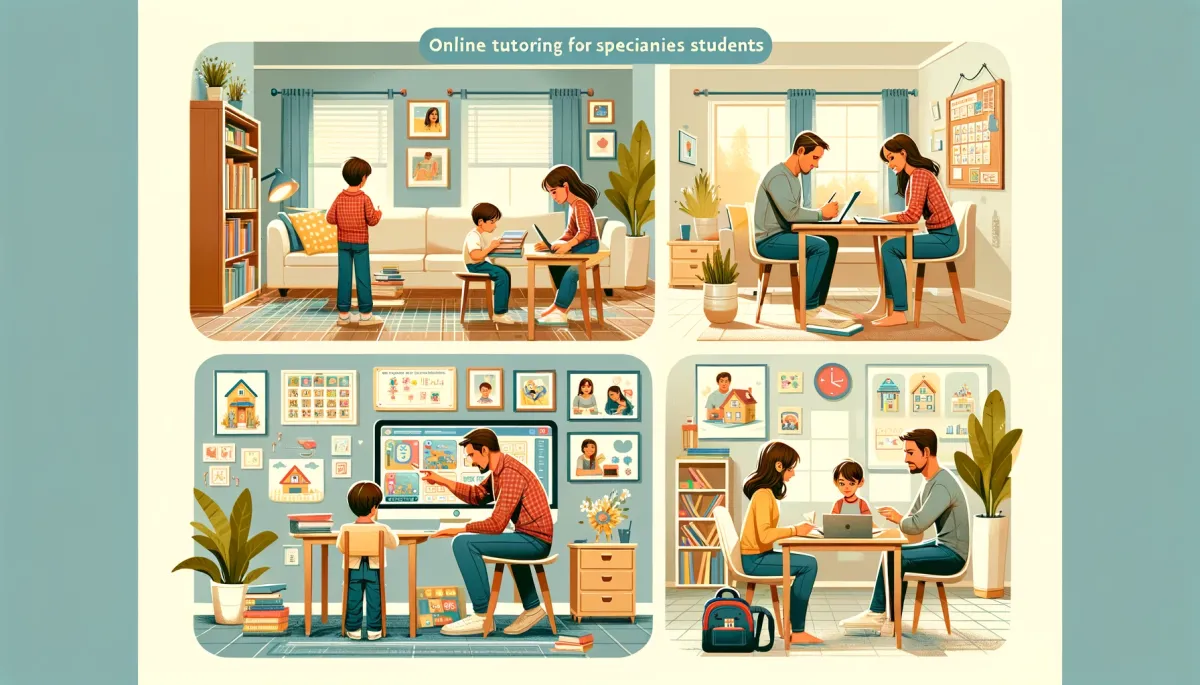
9. Parental Involvement
"Education is a shared commitment between dedicated teachers, motivated students, and enthusiastic parents," says Bob Beauprez. This trinity becomes even more crucial when the student has special needs. Parental involvement can significantly impact the success of online tutoring for special needs students.
Regular Updates
Keeping parents in the loop is not just good practice; it's essential for effective special needs education.
Solutions:
- Weekly Newsletters: Use platforms like Mailchimp to send out weekly updates on what was covered during the tutoring sessions and what's coming up next.
- Progress Reports: Regularly update parents on their child's academic progress and any milestones reached.
For more on effective communication with parents, you can refer to Communicating Effectively with Parents of Students.
Parent-Teacher Conferences
Virtual parent-teacher conferences can provide a more in-depth understanding of a child's progress and any challenges they may be facing.
Solutions:
- Scheduled Meetings: Use scheduling tools like Calendly to set up regular parent-teacher conferences.
- Agenda Setting: Prior to the meeting, send out an agenda to ensure that all critical points are covered.
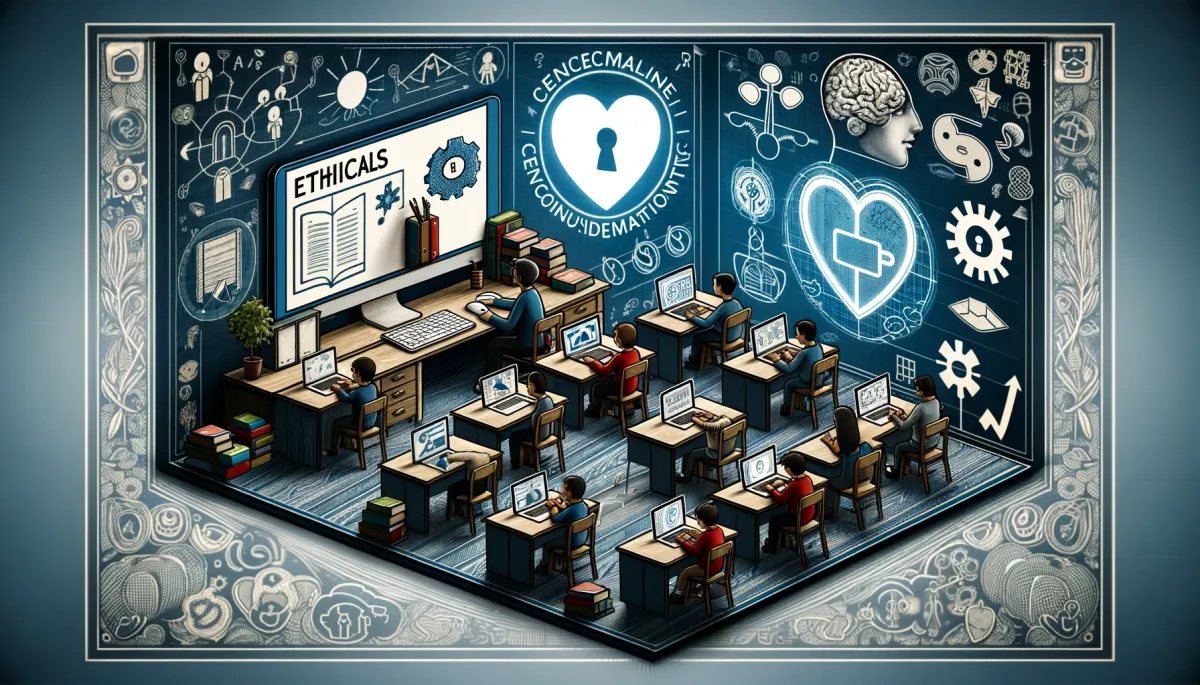
10. Ethical Considerations
As educators, we must adhere to a high standard of ethical conduct, especially when dealing with vulnerable populations like special needs students. "Integrity without knowledge is weak and useless, and knowledge without integrity is dangerous and dreadful," warned Samuel Johnson.
Privacy
Maintaining the privacy of special needs students is not just ethical but often legally mandated.
Solutions:
- Secure Platforms: Use tutoring platforms that are compliant with privacy laws such as GDPR or HIPAA.
- Confidentiality Agreements: Make sure to have confidentiality agreements in place with parents and any teaching assistants involved.
For more on this, check out Ethical Practices in Online Tutoring.
Inclusivity and Fair Pricing
Inclusivity should be at the heart of any educational endeavor, and this is doubly true for special needs education.
Solutions:
- Sliding Scale Fees: Offer a sliding scale fee structure to make your services accessible to families from various economic backgrounds.
- Scholarships: Consider offering scholarships or free initial sessions for low-income families.
For more on pricing your services ethically, you might find our guide on Online Tutoring Rates: How to Price Your Services useful.
Ethical considerations are not just checkboxes to tick off; they are the foundation upon which the edifice of effective and humane special needs education is built.

11. Measuring Success
"Success is not the key to happiness. Happiness is the key to success. If you love what you are doing, you will be successful," said Albert Schweitzer. In the context of online tutoring for special needs students, success is multi-faceted and extends beyond academic performance.
Feedback Loops
Feedback loops are essential for continuous improvement and adaptation.
Solutions:
- Surveys: Use platforms like SurveyMonkey to create post-session surveys for both students and parents.
- One-on-One Feedback Sessions: Schedule periodic feedback sessions with students and parents to discuss progress and areas for improvement.
For more on this, delve into our guide on How to Give Effective Feedback to Online Students.
Academic Performance
While grades aren't everything, they are a tangible metric that can be used to gauge academic progress.
Solutions:
- Regular Assessments: Use online assessment tools to regularly evaluate the student's grasp of the subject matter.
- Progress Tracking Software: Utilize software that can track academic progress over time.
Emotional Well-being
The emotional well-being of the student is often an overlooked but crucial aspect of their overall development.
Solutions:
- Emotional Check-ins: Begin or end each session with a quick emotional check-in.
- Well-being Surveys: Use specialized surveys to assess the emotional and psychological well-being of the student.
For more on measuring success, you can refer to How to Measure Your Success as an Online Tutor.
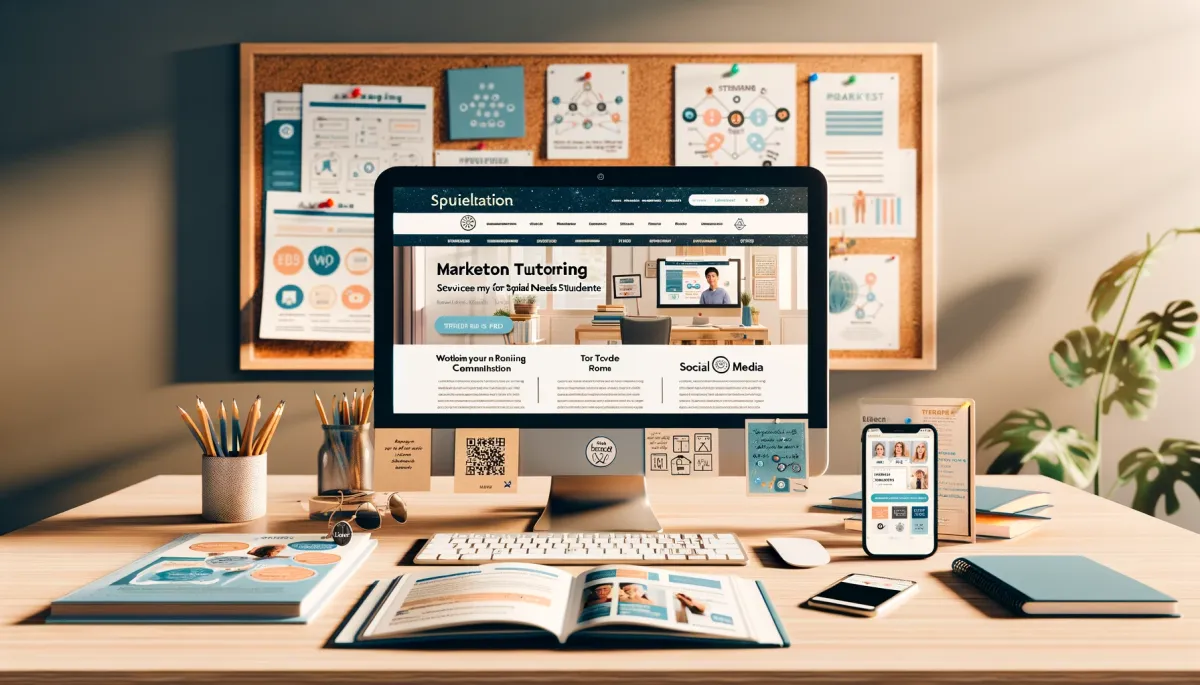
12. Marketing Your Services
As Peter Drucker said, "The aim of marketing is to know and understand the customer so well the product or service fits him and sells itself." In the realm of online tutoring for special needs students, effective marketing is not just about visibility but also about building trust.
SEO Strategies
Search Engine Optimization (SEO) is crucial for anyone looking to establish an online presence.
Solutions:
- Keyword Research: Use tools like SEMrush to find keywords that potential clients are likely to search for.
- On-Page SEO: Make sure your website and blog posts are optimized for these keywords.
For a deeper dive into SEO, check out Marketing Yourself as an Online Tutor.
Social Media
Social media platforms are excellent channels for reaching a broader audience.
Solutions:
- Targeted Ads: Use Facebook and Instagram's targeted advertising features to reach parents of special needs children.
- Content Marketing: Share valuable content that addresses common challenges and questions parents might have.
Testimonials
Word of mouth is incredibly powerful, especially when it comes to services as personal as tutoring.
Solutions:
- Request Reviews: After a successful tutoring session or milestone, ask parents or students for a testimonial.
- Showcase Testimonials: Feature these testimonials prominently on your website and social media.
For more on leveraging testimonials, explore How to Ask for Reviews and Testimonials from Students.
Marketing isn't just about selling your services; it's about establishing a brand of trust and reliability, especially crucial when dealing with special needs students and their families.

13. Legal Aspects
Navigating the legal landscape of online tutoring for special needs students is a critical endeavor. The legalities encompass contracts, payment, and invoicing, among other facets.
Contracts
A well-drafted contract is the cornerstone of any professional relationship. It outlines the responsibilities, expectations, and legal obligations of both parties. For special needs tutoring, the contract should also specify any accommodations or specialized services that will be provided.
Payment and Invoicing
Payment terms should be clearly outlined in the contract. Utilize secure and transparent methods for transactions to build trust. Invoicing should be straightforward, with a detailed breakdown of services rendered. Platforms like PayPal or Stripe offer invoicing templates that can be customized for educational services.

14. Case Studies
Case studies offer invaluable insights into the practical aspects of online tutoring for special needs students. They serve as empirical evidence of what works and what doesn't, providing a roadmap for both new and experienced tutors.
Success Stories
How Does One-on-One Tutoring Support Student Self-Efficacy? - This study delves into the impact of one-on-one tutoring on a high school student with learning disabilities. It highlights the positive influence on the student's self-efficacy.
Diverse Needs of Students with Learning Disabilities - This exploratory case study focuses on the tutoring of two eighth-grade students with learning disabilities, offering qualitative insights into the diverse needs and effective strategies for engagement.
Lessons Learned
Online Tutor 2.0: Methodologies and Case Studies for Successful Learning - This research offers methodologies and case studies that demonstrate successful cases in online education, including special needs students.
A Case Study With Students Who Are Deaf or Hard of Hearing - This study explores remote tutoring in biochemistry and general chemistry with students who are deaf or hard of hearing, offering unique challenges and solutions.
For a deeper dive into the intricacies of online tutoring for special needs, you may find our guide on ethical practices in online tutoring to be a valuable resource.

15. Future Trends
The future of online tutoring for special needs students is not just promising; it's transformative. With advancements in technology, the horizon is expanding, offering unprecedented opportunities for both tutors and students.
AI in Special Needs Education
Artificial Intelligence (AI) is poised to revolutionize special needs education. AI can adapt to individual learning styles, offering personalized lesson plans and real-time feedback. For instance, AI algorithms can analyze a student's interaction with educational software and adjust the curriculum accordingly.
Virtual Reality Applications
Virtual Reality (VR) offers an immersive learning experience that can be particularly beneficial for special needs students. For example, VR can simulate real-world scenarios for autistic children, helping them adapt to social situations in a controlled environment.
For those interested in the cutting-edge technologies shaping the future of online tutoring, our article on the future of online tutoring trends to watch offers a comprehensive overview.

Conclusion
The realm of online tutoring for special needs students is a complex yet rewarding landscape. It demands specialized training, ethical considerations, and a deep understanding of both technological tools and human psychology. As Albert Einstein once said, "It is the supreme art of the teacher to awaken joy in creative expression and knowledge." This guide aims to be your compass in this noble endeavor, offering a holistic view of the challenges, strategies, and future trends in this specialized field of education.
From understanding the types of special needs to exploring the future trends like AI and VR, this guide aims to be your one-stop resource. It's not just about overcoming challenges; it's about transforming them into opportunities for unparalleled growth and meaningful impact.
For those embarking on this journey, remember that the road may be long, but the rewards are immeasurable. Your role as a tutor for special needs students is not just a job; it's a calling that has the power to change lives profoundly.

Frequently Asked Questions (FAQs) on Online Tutoring for Special Needs Students
What is Online Tutoring for Special Needs Students?
Online tutoring for special needs students refers to the use of digital platforms to provide personalized educational support to children and adults with various learning challenges, such as ADHD, autism, and other learning disabilities. The aim is to offer a tailored learning experience that accommodates the unique needs of each student.
How Does Online Tutoring for Special Needs Differ from Traditional Tutoring?
Online tutoring for special needs often involves specialized training for tutors, the use of adaptive technologies, and individualized lesson plans. Unlike traditional tutoring, it allows for greater flexibility in scheduling and can be more easily adapted to suit the specific needs of the student.
What Types of Special Needs Can Be Accommodated?
Online tutoring can accommodate a wide range of special needs, including but not limited to:
- Learning Disabilities
- Autism Spectrum Disorders
- ADHD
- Emotional and Behavioral Disorders
What Are the Challenges in Online Tutoring for Special Needs?
Some challenges include technological barriers, maintaining student engagement, and providing individualized attention. However, these challenges can often be mitigated with the right strategies and tools. For more on overcoming these challenges, you can read our article on the challenges of online tutoring and how to overcome them.
Do Tutors Need Specialized Training?
Yes, specialized training is often required to effectively tutor special needs students. This training can include certifications, courses, and real-world experience dealing with special needs education.
How Can Parents Be Involved?
Parents can be involved through regular updates and parent-teacher conferences. Their involvement is crucial for setting goals, tracking progress, and making necessary adjustments to the tutoring program.
What Ethical Considerations Are There?
Ethical considerations include ensuring privacy, inclusivity, and fair pricing. Tutors must adhere to ethical practices to maintain the trust and safety of both students and parents.
How Do You Measure Success in Online Tutoring for Special Needs?
Success can be measured through various feedback loops, academic performance metrics, and assessments of emotional well-being. It's important to have a multi-faceted approach to gauge the effectiveness of the tutoring sessions.
What Future Trends Are Emerging in This Field?
Future trends include the integration of Artificial Intelligence (AI) for personalized learning experiences and the use of Virtual Reality (VR) for immersive educational scenarios.
Can Online Tutoring for Special Needs Be As Effective As In-Person Tutoring?
Studies indicate that online tutoring can be just as effective as in-person tutoring when conducted properly. The key is to use specialized methods and tools designed for special needs education.

